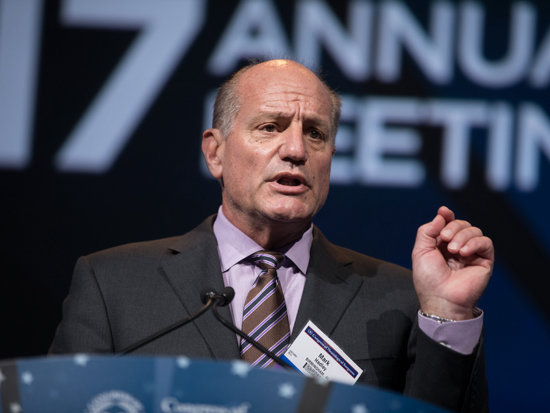 Mark N. Hadley, M.D., FAANS, University of Alabama at Birmingham Department of Neurosurgery Charles A. and Patsy W. Collat Endowed Professor of Neurosurgery, was the distinguished guest lecturer at the Fourth Annual Advances and Innovations in the Management of Spine Disorders Symposium, hosted by the University of Connecticut UConn Health Department of Neurosurgery.
Mark N. Hadley, M.D., FAANS, University of Alabama at Birmingham Department of Neurosurgery Charles A. and Patsy W. Collat Endowed Professor of Neurosurgery, was the distinguished guest lecturer at the Fourth Annual Advances and Innovations in the Management of Spine Disorders Symposium, hosted by the University of Connecticut UConn Health Department of Neurosurgery.
During the symposium, held on June 18 and 19, 2024, Hadley delivered a compelling lecture titled "Acceleration."
Hadley, a respected leader in the field, has made significant contributions to neurosurgery through his extensive research, leadership, and dedication to patient care. His career is marked by over 200 published papers and more than $4 million in federal grant support funding, underscoring his impact on the advancement of spine surgery.
During his lecture, Hadley highlighted the advancements in neurosurgery which have revolutionized diagnostic and procedural capabilities. He emphasized the importance of continuous learning, staying current with the science of neurosurgery and adapting to new technologies to improve patient outcomes.
Hadley also shared insights from his personal and professional journey, recounting his childhood, his family life, his educational history, his tenure as a neurosurgeon in the United States Air Force, and his career progression at the University of Alabama at Birmingham. He stressed the importance of maintaining a balance between personal health and professional responsibilities, advising colleagues to prioritize good physical and mental health, sufficient sleep, and exercise. He discussed adversity, shared his own and reminded the audience that, "It's not just the adversity one experiences that defines an individual, it is how they advance through it, what they might learn from it, their strategy for going forward."
Known for his integrity and dedication to education, teaching and mentorship, Hadley previously served two decades as director for the UAB Department of Neurosurgery’s residency and spinal surgery fellowship programs, guiding numerous young neurosurgeons in their careers. He promotes continuous learning and skill development, personalized patient-centric care, "having a modest dose of ‘paranoia’ within you about your patients and what you might be missing,” and retaining one's general medical knowledge and education in neurology as keys to a successful career in neurosurgery. He encourages more than just patient care; he invites all in neurosurgery to pursue academic and scientific interests. Hadley is widely recognized for his work in advancing the medical evidence science in spinal surgery and the advancement of treatment strategies and surgical techniques to improve patient outcomes.
Hadley’s contributions to neurosurgery are not limited to his patient care and mentorship roles. He has been actively involved as a leader in major neurosurgery societies, including the American Board of Neurological Surgeons, the American Academy of Neurological Surgery, the American Association of Neurological Surgeons, and the Congress of Neurological Surgeons. His leadership in these organizations has helped shape the future of neurosurgery, ensuring that the field continues to advance and evolve.
In addition to his clinical and medical teaching responsibilities, Hadley is also a professor in the University of Alabama at Birmingham Collat School of Business, where he has introduced novel courses for both undergraduate and graduate students on the "business of medicine.” His dual appointment in medicine and business makes him one of only a few UAB faculty members to be appointed to two different schools of academia on the same campus.
Finally, Hadley encouraged his audience to embrace neurosurgical responsibilities with enthusiasm and to find joy in their professional journey. Hadley's dedication to his career, students, and patients, along with his commitment to personal health and wellness, continues to inspire his peers and mentees in the medical community. His contributions to the field of neurosurgery have potentially improved the discipline and science of neurosurgery, hopefully offering encouragement to current and future neurosurgeons that their efforts, whatever their sub-specialty in neurosurgery, and whatever their practice focus – private or academic – may contribute to the specialty as well.